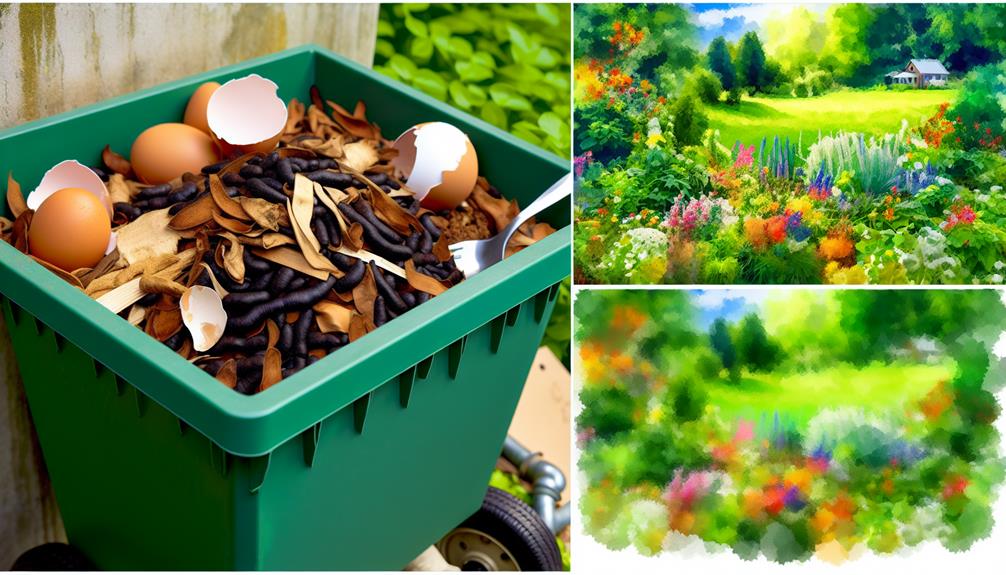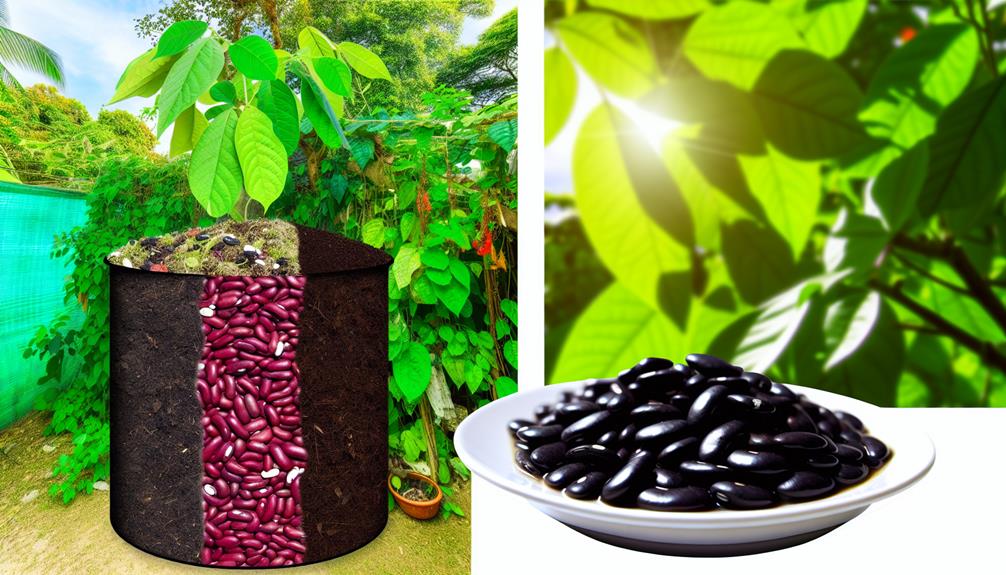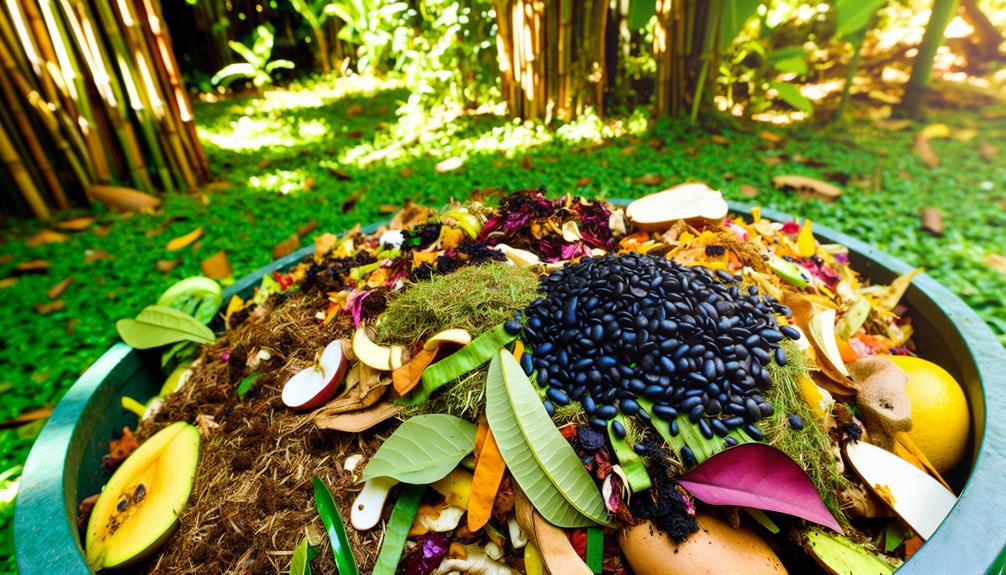

Yes, you can absolutely compost black beans, and doing so will enrich your compost with valuable nutrients! Both cooked and uncooked beans work well, although cooked beans decompose faster due to their softness and moisture content. The nitrogen in black beans aids leaf growth, while phosphorus supports root development and flowering, making your compost wonderfully fertile.
Just balance them with dry leaves or straw to guarantee adequate airflow and prevent mold. Regularly turning your compost ensures the beans decompose efficiently, providing your garden with nutrient-rich soil. Discover more tips and benefits to make the most of composting with black beans!
Packed with essential nutrients, black beans are an excellent addition to any compost pile. They break down to enrich your compost with important components that boost plant growth.
When you add black beans to your compost, you’re providing:
Including black beans in your compost creates a nutrient-rich environment that fosters a thriving garden. Embrace the power of these beans to cultivate a sustainable, vibrant community of plants.
Also Read: Can You Compost Rotten Bananas?
When composting black beans, you’ll notice key differences between cooked and uncooked beans.

Cooked beans break down faster due to their softness, but they might attract mold more easily.
On the other hand, uncooked beans take longer to decompose and have a different nutrient release pattern.
Comparing cooked and uncooked black beans reveals significant differences in their nutrient breakdown. When you compost these beans, understanding how their nutrients vary is crucial to optimize your compost.
Being aware of these differences ensures your compost remains nutrient-rich and efficient, fostering a sense of community around sustainable practices.
Decomposition times vary greatly between cooked and uncooked black beans due to differences in their physical and chemical properties. Cooked beans break down faster because they’re softer and have more moisture, making them easier for microbes to digest.
On the other hand, uncooked beans are tougher and take longer to decompose due to their hard outer shells and lower moisture content.
When you’re composting, consider whether your black beans are cooked or uncooked to anticipate how quickly they’ll contribute to your compost pile. Cooked beans can speed up the composting process, helping create rich soil faster.
Including both types can balance your compost, ensuring a steady breakdown of materials. Join the composting community by understanding these nuances and enhancing your green efforts!
In addition to decomposition rates, you should also consider the potential for mold growth when composting cooked versus uncooked black beans. Cooked beans are more susceptible to mold because they retain moisture, creating an ideal environment for mold spores.
On the other hand, uncooked beans are drier, reducing the likelihood of mold development.
Here are some key points to keep in mind:
Also Read: Can You Compost Carrot Peel?
While composting black beans offers numerous benefits, you should be mindful of potential issues that might arise during the process. Here are some key points to watch for:
To add black beans to your compost, start by breaking them down into smaller pieces to expedite decomposition. Crush the beans or cut them up; this step helps microbes break them down faster.
Mix the beans thoroughly into your compost pile to guarantee even distribution. Layer the beans with other compost materials, like kitchen scraps and yard waste, to maintain a balanced mix. Black beans are rich in nitrogen, so they’ll boost the compost’s nutrient content.
Turn your compost regularly to aerate it, making sure the beans decompose efficiently. By engaging in this process, you’re contributing to a community of eco-conscious individuals who value sustainability.
Together, we can make a difference, one compost pile at a time.
Also Read: Can You Compost Rust?
To maintain your compost pile balanced, you’ll need to pay attention to the carbon-nitrogen ratio, moisture, and aeration.

Make sure you mix green materials like black beans, which are rich in nitrogen, with brown materials such as leaves or straw, which provide carbon.
Keep the pile moist but not soggy, and turn it regularly to guarantee proper airflow and prevent unpleasant odors.
Achieving the appropriate carbon-nitrogen ratio is crucial for a healthy and efficient compost pile. A balanced mix guarantees that your compost breaks down efficiently and produces rich, fertile soil. You need a ratio of about 30 parts carbon to 1 part nitrogen.
Here’s how you can achieve this:
Maintaining proper moisture and aeration in your compost pile guarantees that the materials break down efficiently and prevent unpleasant odors.
Keep your compost as moist as a wrung-out sponge, ensuring it isn’t too wet or too dry.
Regularly turn the pile using a pitchfork or shovel to introduce oxygen, which is essential for microbial activity.
Layering green (nitrogen-rich) and brown (carbon-rich) materials helps maintain balance.
If you’re composting black beans, mix them with dry leaves or straw to improve airflow.
Don’t hesitate to ask for input from fellow composters; sharing experiences fosters a sense of community and learning.
Composting black beans is a great way to enrich your soil and reduce waste. Whether they’re cooked or uncooked, black beans can boost your compost with valuable nutrients.
Just remember to balance them with other compost materials to maintain a healthy pile. By composting beans, you not only help the environment but also create a thriving garden.
So, don’t hesitate—start adding those black beans to your compost today and watch your garden flourish!
